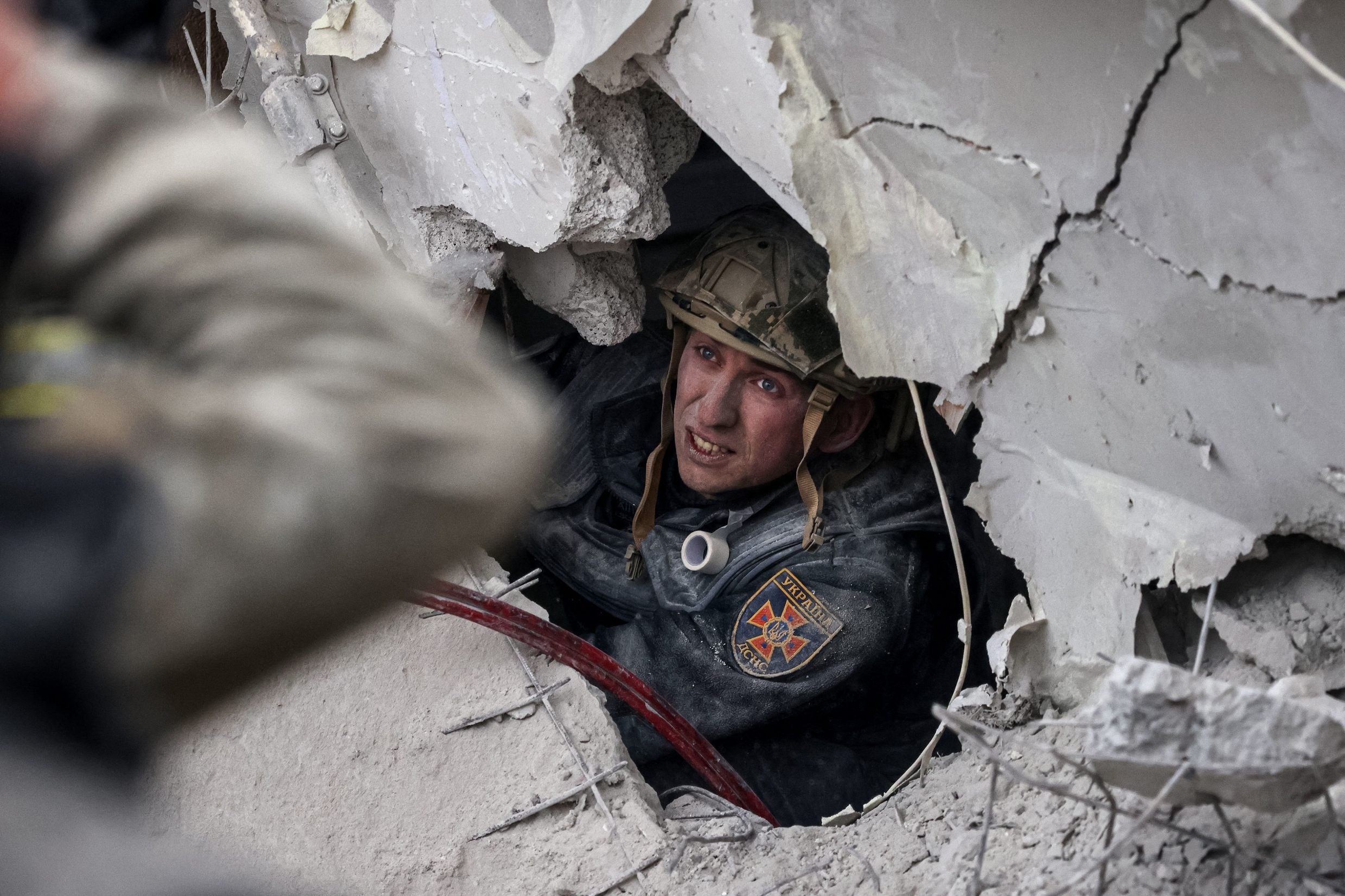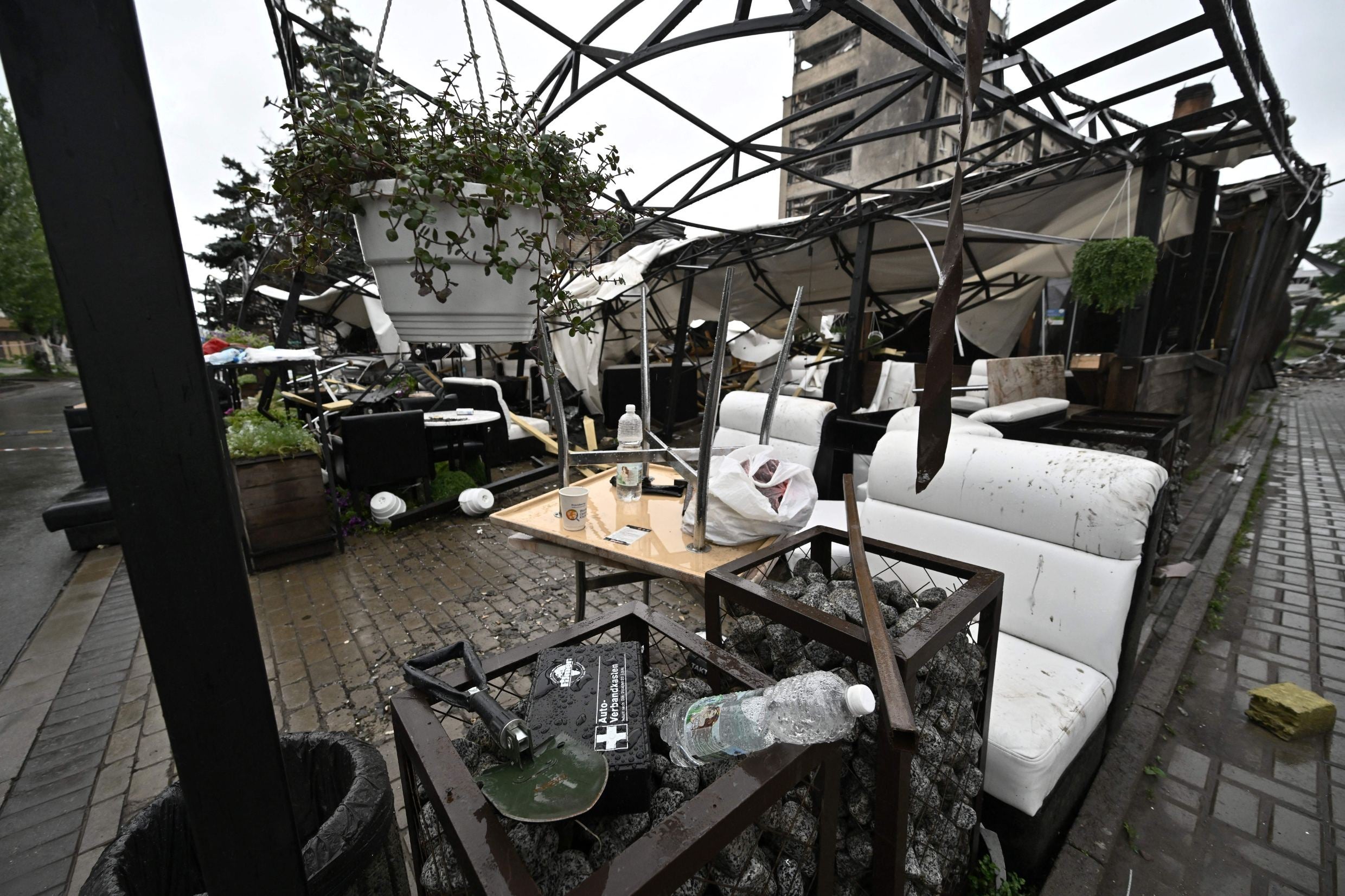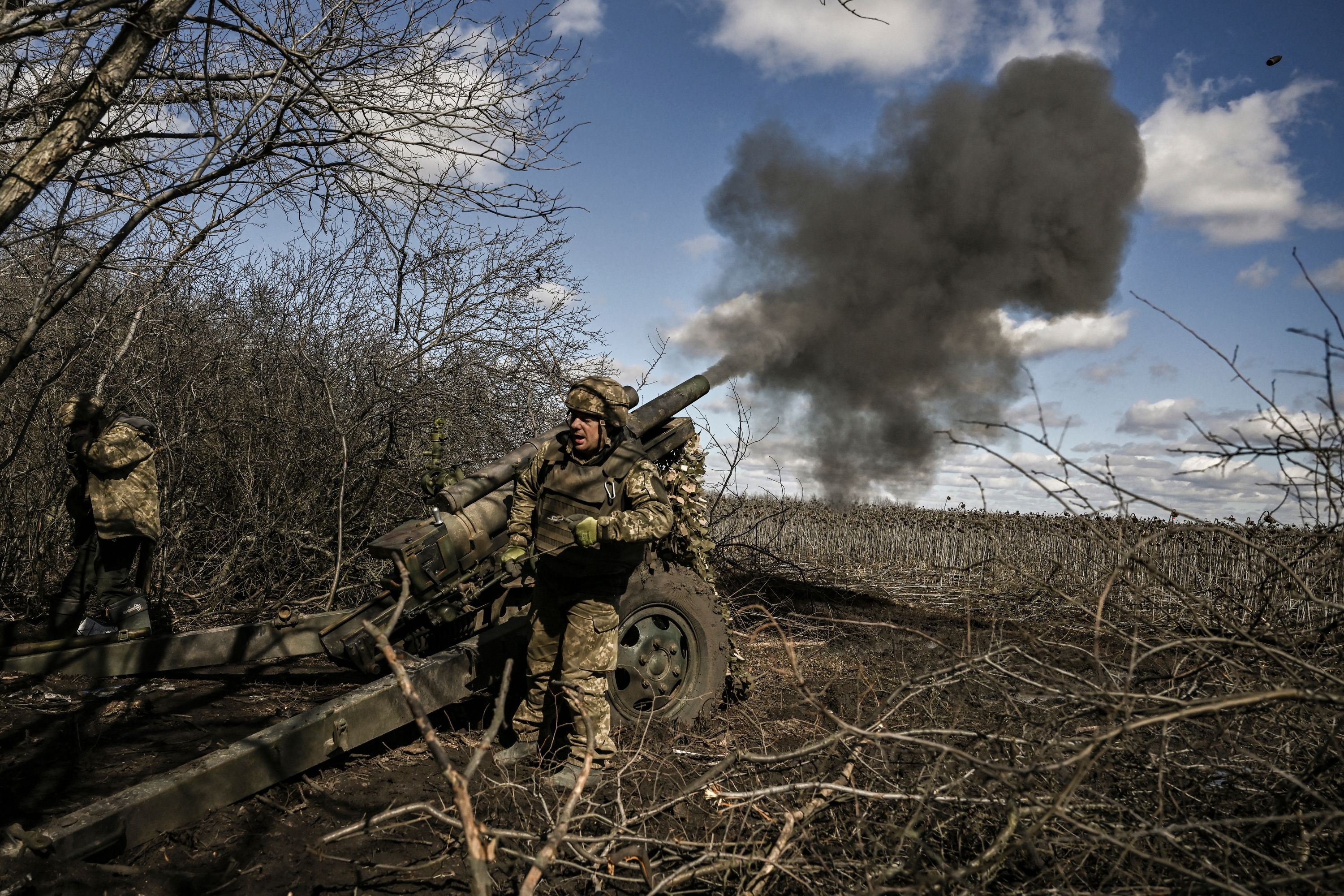Dodging a constant assault of Russian missiles – the war-weary keep fighting in Ukraine’s blood-soaked east
There is plenty of pride in the cities around the frontline in managing to keep Putin’s forces at bay, writes Kim Sengupta from Druzhkivka. But it has come at the cost of crushing loss


The missile aimed at the mayor’s office took an estimated 64 seconds to fly 55 miles and detonate in shrapnel and flames after being fired by Russian forces.
Thankfully for Oleksandr Goncharenko, the mayor of Kramatorsk – near the frontline in east Ukraine – it missed the target by 200 metres, hitting a garden square.
The municipal headquarters was swiftly moved to another building for safety. But that building was bombed as well, resulting in a move to yet another location, dodging the missiles coming from the city of Horlivka, which has been captured by Vladimir Putin’s forces.
“The difference between the Russians trying to hit Kramatorsk from occupied areas and other Ukrainian cities, like Dnipro for instance, is that the missiles get here so quickly. I am not sure how many anti-aircraft systems are around here that can deal with things moving that fast,” says Mayor Goncharenko, hunkered down in a sandbagged basement in his latest office.

Now also the head of the military administration, Goncharenko will keep relocating with his staff in an attempt to thwart the expected Russian attacks, while keeping the city functioning.
“The Russians have been carrying out lots of missile strikes. Their aim is to destroy infrastructure – government buildings, factories as well as military targets. And, as we have seen, they do not mind killing civilians,” he says.
The threat from Russia’s forces has been constant for the people of the Donbas region. I met Goncharenko last summer, in his spacious office in the city’s historic municipal building. He was organising a mass evacuation from two of the main cities in the Donbas, Kramatorsk and neighbouring Slovyansk, both of which were in danger of falling to Russian armour rolling in from two directions.
“We were telling residents to leave, there was no other choice. But then our troops thankfully held the line, and we then started to take back territory”, says Goncharenko.

“We faced another battle after that, coping with winter. It was very hard, but we managed to get gas from Kharkiv after most of the area was liberated, and that helped a lot. We still face attacks from air, and also artillery which they use nearer the frontline. The Russians are not going forward, although they are trying. They use ballistic missiles and also heavy guns more and more – they are frustrated and not advancing,” he says.
The death toll keeps rising in the Donbas – three were killed by artillery fire near the city of Lyman last week. Two women and a man, all elderly, were sitting on a bench in the village of Torske, chatting in the sunshine, when the shells landed. Two others were wounded.
“They did not want to leave their homes, this village. They used to meet each other for company, for comfort. But even that is now taken away,” says Svetlana Vasiliyeva, their neighbour.
Thirteen people were killed, including three children, when two missiles were fired at a pizzeria in Kramatorsk city centre recently: another 56 were injured. Among the dead was 37-year-old Victoria Amelina, who had been investigating war crimes and human rights abuses by Russian forces.
Two weeks ago, the Russians carried out a “double tap” attack on another Donbas town, Pokrovsk, in which nine people were killed and 82 injured. The first blast was followed by another one just as the emergency services arrived. The targets included a hotel much used by aid workers and civilian volunteers.
Residents of Donbas have come to accept that more fatal attacks are inevitable as the conflict grinds on, with air strikes and artillery rounds being launched beyond frontlines upon which troops from both sides are locked in bloody stalemate.
Alona, a 23-year-old student, was due to be at the pizzeria on the evening of the bombing. “It was a birthday party for another girl, Violeta. But I had an uneasy feeling all day and persuaded her to move it somewhere else,” she says. “I’ve had this kind of feeling since when I was a child, I can’t really explain it. It was very, very strong that day about the pizzeria. I certainly wouldn’t have gone; I’m glad I persuaded my friends not to go.”
Memories of carnage are only too common here. Putin ordered waves of air strikes across Ukraine last October in revenge for the Kerch Bridge connecting occupied Crimea to Russia being blown up. In Slovyansk, a brother and a sister who had fled their home near the frontline and resettled with a new family, were victims of a missile attack.

Kateryna, 25, died along with two members of her adoptive family, the Sudovas, as their home was destroyed. Innocent lives lost to Russian brutality. Her brother, Ruslan, 12, survived but was injured severely. Kateryna used to play violin in the street for war-weary residents. She was killed along with Elena and Oleksei Sudova.
Blast waves from the missile, believed to be a long-range S-300, blew down the house across the road, killing Zoya Mekhtiyeva, a 45-year-old teacher at the local technical college who had been carrying out voluntary work in her spare time. Zoya had been staying at her sister’s home. Her brother-in-law, Vladimir Chumak, recalls that terrible day: “Everything changed. So many lives were taken for no reason. Did the people who fired the rocket even think for one minute about what they were doing?”
The sheer number of lives lost during Russia’s 18-month invasion is overwhelming. But each story involves a family having to carry the memory of loss and sorrow.
Ludmilla Sokolova is a victim of one of the worst air strikes on civilians in this war. In April last year, two months after the start of the invasion, the railway station in Kramatorsk was hit by two Tochka-U missiles fired from Shakhtarsk in the Russian-backed separatist “Donetsk Republic”. The attack killed 63 civilians, including nine children, and wounded 151 others.
Ludmilla, 70, was waiting at the station with her family of seven, including two grandchildren, when the missiles hit. She suffered extensive leg injuries. Her grandson and grandaughter received shrapnel wounds. Her married daughter, Svetlana, was among those who died.

“Not a day goes by when I don’t think of that day: at night I still have bad dreams about what happened. I wish that God had taken me instead of my daughter. A little boy [and] a little girl have been left without their mother by that bomb,” Ludmilla says, with tears rolling down the deep lines on her cheeks.
Ludmilla lives by herself. “The rest of my family are in Rivne. They all have futures ahead of them. Why should they live in danger here? I am old and not well, there is constant pain from my injury. I’ll stay and accept what happens. Things are not good, are they? But we are still in Ukraine. We are thankful for that,” she says.
There is huge relief that the Russians have been stopped from storming through this region – and fierce pride in the resistance shown by the army and the people of Donbas. But there is also exhaustion among many after 18 unrelenting months of war.
“The population here in the east has grown older since the war began. It’ll get even older when the new mobilisation laws come in as they say’s going to happen,” says 24-year-old Yuri Melnyk from Slovyansk. “More young people like me will be called up for the army.”
“Look, I can understand how these elderly people feel. They’ve had a very hard past and they deserved to live out their lives in peace. It is a great shame they are facing this. But we have to fight for our country, and now we have to keep going forward. This war is going to go on for a very long time.”
Yelena, 64, and Antonina, 83, talk of their hopes for the war to end soon as they sit on a bench together in the town of Druzhkivka.
As an air-raid alarm sounds again, Yelena raises her hands in despair. “Surely someone, the politicians, the foreign governments can end this fighting,” she says. “How much longer can this continue?” She looks down to the ground. “Maybe this is our fate. But it is a cruel fate.”
Both of the women’s families have been living away since the war started. “The children needed to be somewhere less dangerous. But I miss my family, my grandchildren, my great-grandchildren,” says Antonina. “It feels very lonely now. I would like to spend some time with them before I die.”
Join our commenting forum
Join thought-provoking conversations, follow other Independent readers and see their replies
Comments
Bookmark popover
Removed from bookmarks